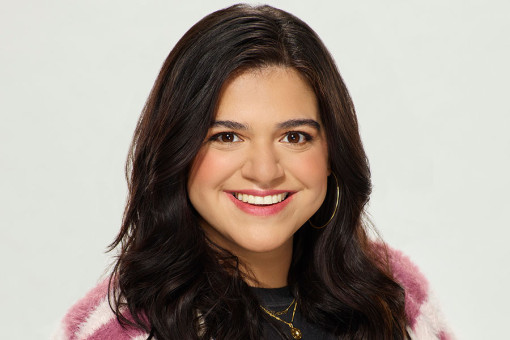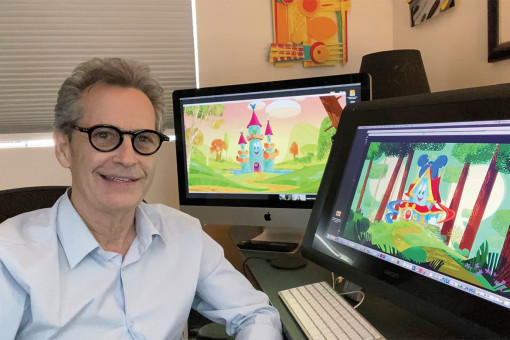Increasingly, animated series aimed at children, tweens and teens feature diverse characters who reflect the diversity of their audiences. Just as important, there's a movement to match this onscreen representation on the production side.
"If kids see people who look like them, their self-esteem is higher. Their success in school is greater. They have greater longer-term outcomes," says Sara DeWitt, senior vice president and general manager, PBS KIDS. At the outset of any production, PBS asks for a diversity and inclusion plan. "These stories really need to be authentic to truly be representative," she adds.
Emmy contributor Amy Amatangelo talked to creative talent behind six shows at PBS, Netflix and Disney about how they ensure diversity on both sides of the camera.
Molly of Denali
Now in its third season, this PBS KIDS series follows Molly Mabray (Sovereign Bill), a ten-year-old Alaska Native girl and her adventures in the fictional village of Qyah, Alaska.
"We want to make sure we are representing the multitude of cultures that are part of Alaska," says creative producer Yatibaey Evans, an Ahtna (Athabascan) and former director of the Alaska Native Education program in Fairbanks.
Princess Daazhraii Johnson, a writer and member of the show's Alaska Native advisory group, adds, "For so long, being a writer, actor, director or producer just wasn't accessible. It didn't seem like a possibility for us." Johnson, who is Neets'aii Gwich'in, remembers exactly how she felt when she first learned about Molly of Denali (created by Kathy Waugh and Dorothea Gillim). "Molly is me. Molly is my kids. Molly is us."
My Dad the Bounty Hunter
In Netflix's new series from Everett Downing (Hair Love) and Patrick Harpin (Hotel Transylvania 2 and 3), siblings Lisa and Sean stow away on their dad's business trip, unaware that he's an intergalactic bounty hunter. Despite the dangerous aliens, robots and laser fights, the Black family at the heart of this series is relatable.
The show marks Downing and Harpin's first time as series creators and executive producers. Wanting to provide others with similar career opportunities, they cast a wide net when staffing their writers' room. "Lot of first-time [writers] on our show," Downing says.
"We were adamant. These people can do it. We've seen their writing before," he adds. "It's all about advocacy — giving those opportunities to people and getting them to a point where they are ready. If you're bringing in all these people, you're going to get a richness that you normally would not have."
Firebuds
Krystal Banzon (I Feel Bad) had never written for animation before joining Disney Junior's Firebuds. The series follows Bo Bayani (Declan Whaley) and his talking fire engine Flash (Terrence Little Gardenhigh) as they team up with other pint-sized first responders to help their community.
A first-generation Filipina American, Banzon brings her own experiences to the show (created and executive-produced by Craig Gerber). One episode found Bo, who has a Filipino dad and a Jewish mom, making lumpias (Filipino spring rolls) with his lolo (grandfather). "It's amazing how cultural specificity brings us together," Banzon says. "The more specific you are, the more somebody from another culture will be like, 'My grandfather was like that, too!'"
She enjoys sharing the show with her family, noting, "It's so exciting for them. My elders said, 'I never saw this growing up.' So much can be mined from the culture. It would be a missed opportunity if we didn't take those details and write about them."
Rosie's Rules
Five-year-old Rosie Fuentes (Ellora Lopez) lives in Texas near the Mexican border in this PBS KIDS series from creator and executive producer Jennifer Hamburg. Rosie's papá is from Mexico City and her mom is from Wisconsin.
Amanda Martínez voices Abuela (grandmother) and, as the series' cocomposer, infuses its music with traditional songs and sounds, like that of the Mexican harp. "We were really trying to incorporate authentic instruments," she says. "Having that variety is refreshing. It's so easy to stereotype what Mexican music is."
Series executive producer Mariana Diaz-Wionczek (Dora the Explorer) says one key to ensuring diversity is to build time into the production schedule to find the right people. "The answer 'I cannot find a diverse person' — that's just not acceptable anymore," she says. "The solution is not to give the assignment to someone who is not the authentic match. Growing your own diverse team will result in growing a more diverse community in the kids' space."
Spirit Rangers
This new Netflix series follows Native American siblings Kodi, Summer and Eddy Skycedar, who can transform into animals and help protect the fictional National Park where they live in California. "I was inspired by all the stories I heard growing up on the reservation about our animals and land," says creator and executive producer Karissa Valencia (Vampirina).
A member of the Santa Ynez Chumash tribe, first-time showrunner Valencia was committed to creating an entirely Native American writers' room. "We had to reach out to our families and tribes for permission and questions. Hollywood has made stuff about us without us, and I didn't want Spirit Rangers to be the same. We assembled the Native Avengers."
Wačíŋyeya Iwáš'aka Yracheta, who voices Kodi, lives on a reservation in South Dakota two hours from any recording studio, so Netflix built one for him. "He walks fifteen feet to work every day," she says. "Netflix really matched my dedication."
The Proud Family: Louder and Prouder
In 2022, creators and executive producers Ralph Farquhar and Bruce W. Smith revived their beloved Disney Channel series The Proud Family (2001–05). The second season of The Proud Family: Louder and Prouder premiered earlier this month on Disney+. "This is the healthiest and most joyful version of the show in terms of making it," Smith says.
"Ask me how many Black female directors there were in TV animation," Farquhar says, holding up his hand to make a zero. "We had to find them," Smith adds. "We had to instill them with the confidence that they can command a crew. I think artists will rise to the occasion given the opportunity."
Farquhar adds that they wanted to make a splash behind the screen: "If you see it, you can be it. I truly believe we have the most diverse crew in Hollywood. That's what's going to change [this industry over] the next twenty years."
This article originally appeared in emmy magazine issue #1, 2023, under the title, "Redrawing the Lines."






















